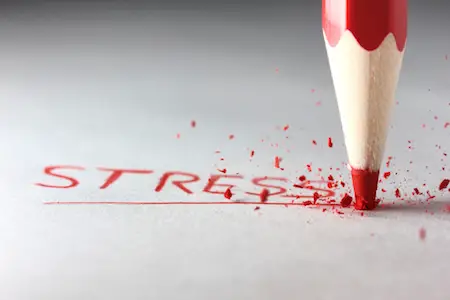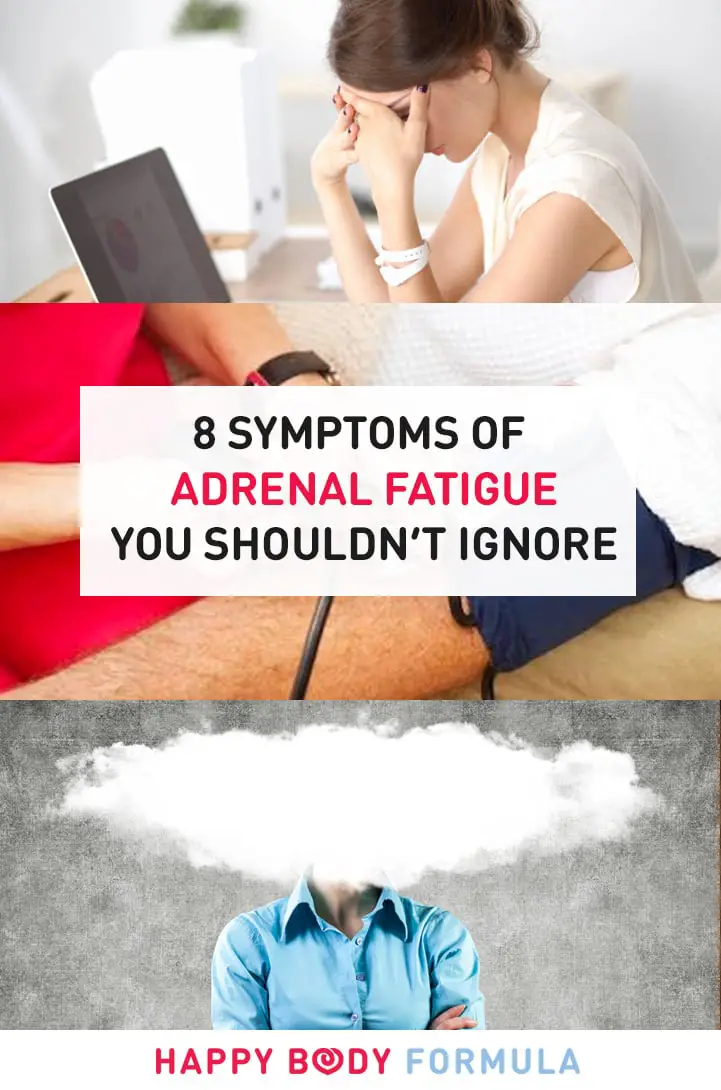Medically review by Kim Langdon

Adrenal fatigue can be described as hypoadrenia (essentially, an adrenal deficiency or inefficiency) or 'the stress syndrome.'
It's essentially a buildup of stress, whether that happens due to stressful events over time or a severely stressful/traumatic event at once, that compromises the integrity of the adrenal glands.
The adrenal glands help us to maintain a certain resilience to stress due to their hormonal release.
These hormones influence the body's physiological processes in many ways from metabolism to sex drive to allergies.
Signs & symptoms of adrenal fatigue
The thing about adrenal fatigue is that there is no definitive test.
Even worse, if you bring it up with your primary care physician, the chances of them recognizing adrenal fatigue or diagnosing it are relatively slim.
Finally, adrenal fatigue exists on a spectrum.
Two severe forms of adrenal conditions that include Cushing's disease (excess adrenal hormone production) and Addison's disease (not enough adrenal hormone production), but these forms of the syndrome are much fewer and further between than plain ol' adrenal fatigue, which impacts many more lives than we think.
Getting an official diagnosis can be a huge feat, but being aware of what you should look out for can put you a step ahead of the game.
That way, you have the knowledge to discuss your concerns and seek out for yourself what's next in recovery.
Here are the main adrenal fatigue symptoms to watch out for.
1. The ability to handle stress has decreased

Do you feel as though you've grown far more sensitive to the blows of life?
Many of us work hard to develop healthy coping mechanisms to deal with the small stressors in life, and we can generally manage with proper lifestyle techniques, emotional processing and relying on our support system(s).
This gives us the ability to handle larger stressors, if and when they happen.
For someone with adrenal fatigue, the small stressors feel big.
The adrenals support our stress, and they release the proper hormones to help respond to stress.
When the adrenals are worn out, they aren't producing enough of these chemicals to adequately respond to stress.
The hormonal issue compromises our awareness, ability to focus, problem-solve, and more.
Some signs your resilience to stress has dropped include crying more often, rapid mood swings, irritability and an inability to move past stressors to focus on your present situation.
Some good lifestyle techniques to address high-stress levels include meditation, journaling, and herbal supplementation for anxiety symptoms.
2. Low blood pressure

Low blood pressure is not often in the spotlight compared to high blood pressure, but it can be one of the best indicators of adrenal fatigue.
A simple test you can to at home to determine if there's a connection is this: measure your blood pressure at home (with a gauge that does not require a stethoscope) after lying down for ten minutes.
First, measure your BP lying down, then measure it standing up; ideally, blood pressure will rise when you stand up, but those who suffer from adrenal fatigue will often notice a drop.
Moreover, you may experience lightheadedness upon standing up. Both symptoms are also indicative of dehydration, so make sure you do this after having enough water.
On the same hand, blood pressure can be a great way to tell if your recovery from adrenal fatigue is effective.
Over time, you should notice your blood pressure levels rise to normal numbers practicing the same test.
These are fantastic tools to have at home to gauge the severity of symptoms and recognize progress.
3. Salt cravings

Our cravings can tell us a lot, but much of what we know is associated with potential nutrient deficiencies. In people with adrenal fatigue, it all cycles back to hormone function.
In the curious case of salt, someone with adrenal fatigue might crave it because they are not producing enough aldosterone.
This makes a huge impact on how our bodies maintain sodium levels, so with less aldosterone comes less of an ability to circulate sodium in the bloodstream.
Over time, as the condition worsens, we are likely to begin craving salty foods because our bodies are smart and recognize the deficiency.
To fully address this problem, you can give into salt cravings to increase sodium levels.
It's important to also increase potassium and water levels in conjunction with sodium, though, to properly stabilize electrolyte levels.
If you're constantly feeling like you crave salty foods and/or feel dehydrated, adrenal fatigue is a real possibility.
Read more about how to choose the healthiest salt, and how you can supplement with "Hunza water" a.k.a. sole to boost sodium levels.
4. Feeling tired when you wake up

Like the name of the syndrome suggests, fatigue is a pretty tell-tale sign.
If you have adrenal fatigue, you might describe the way you feel as 'exhausted' above all, both physically and mentally.
There are two points in the day in which your seemingly chronic fatigue will be most pressing with adrenal fatigue, and number one is in the morning.
If you can't recall the last time you woke up from a night of sleep feeling refreshed and even slightly enthusiastic, something may very well be wrong.
Consider the adrenals' vital role in the production of hormones such as cortisol, which helps us to regulate our naturally occurring, 24-hour sleep-wake cycle a.k.a. the circadian rhythm: In a normal body, the highest levels of cortisol are secreted around 8 a.m. (which helps us rise in the AM), while the lowest levels occur between midnight and 4 a.m.
With adrenal fatigue, cortisol levels are too high or too low, which either keeps us up late at night and cuts into quality of sleep, or impacts blood sugar enough to have us waking up prematurely due to the drastic drop in glucose levels and the subsequent hunger that ensues.
If you wake up feeling like you need to eat, it could be due to low cortisol levels.
5. Increased illness

If you can recall a time before you felt drained, you might also recall seldom getting sick.
Increased happenstance of respiratory illness, basic colds and cases of flu, and negative digestive or allergic to certain foods you weren't previously allergic to can all be symptoms of adrenal fatigue.
Moreover, you'll notice an extended recovery time when trying to bounce back from these illnesses.
In the past, it may have taken you around a week to feel 100% after a cold, and now, you might find those same sinus symptoms and that nasty cough have lasted months.
This is not normal!
First, the immune system is weakened by adrenal stress, especially during times of increased stressors in your life.
If you find your emotional capacity correlates with illness, your cortisol levels might be overly anti-inflammatory which suppresses the immune system.
On the opposite end of the spectrum, too little cortisol can cause an inflammatory response which can often lead to autoimmune disease or marked respiratory issues in particular.
6. Brain fog

Brain fog can be attributed to many things, but adrenal fatigue is a driver of lack of focus, decreased productivity, and an inability to cope as we mentioned above.
The reason why this happens comes down to the body needing more of just about everything to function.
This includes glucose which our brains thrive on.
For someone whose adrenals are in poor standings, the brain may very well not be receiving enough which leads to brain fog, confusion, an inability to focus or problem solve, and even symptoms of anxiety and depression.
These are just a few examples of the damage that adrenal fatigue does to our central nervous system.
The impact of cortisol on the nervous system can also show itself in behavioral changes like sleep disorders, moodiness and irritability, and deteriorating memory.
7. The white line test

In 1917, a man quite ahead of his time developed this simple diagnostic tool that you can use at home to determine whether or not your symptoms may be leading to an eventual adrenal fatigue diagnosis.
To run this test, take the end of a ballpoint pen (not the pen itself) and stroke your abdomen for a length of around six inches.
A line will appear shortly thereafter, and for a normal person, it will swiftly turn from white to red.
In an individual with low adrenal function, the white line will persist for up to two minutes and potentially get larger in width.
While not everyone with adrenal fatigue will experience the 'white line,' individuals who do get the white line can be positive that they have adrenal fatigue.
8. You're relying heavily on stimulants

Caffeine is the untold addiction of the century, and many of us have a mild or moderate dependence on our morning (and sometimes afternoon and evening) cuppa Joe, no doubt about it.
People who suffer from adrenal fatigue should be especially mindful of caffeine consumption, and how much of their livelihood depends strictly on their stimulant use.
Overconsumption of caffeine - or caffeine consumption at all, for some - is a lose/lose situation.
It perpetuates the cycle of poor adrenal health, as it overstimulates the glands which leads to an even worse 'comedown' later when the buzz wears off.
Thus, you're more exhausted than you were before the coffee, and it's hard to get anything done in such a state of fatigue.
The only logical response is to reach for more, but you can see why that's probably a bad idea.
People who think they may be suffering from adrenal fatigue should generally abstain from caffeinated products including teas, decaf coffee, chocolate, and some aspirin/pain relievers entirely.
Read more about caffeine withdrawal symptoms and how to reduce them for better sleep and adrenal health.
Treatment of adrenal fatigue

In order to receive a proper treatment plan and work in conjunction with a health professional, we recommend seeking out a naturopath who might recognize your condition and be able to offer proper care in terms of guiding you with lifestyle choices.
For the most part, a holistic approach is ideal in treating adrenal fatigue, as it's a 'lifestyle disease.'
Thus, it improves greatly when addressed by lifestyle changes including diet, adrenal support supplements, time management, stress relief, and good sleeping habits.
I highly recommend the book 'Adrenal Fatigue: The 21st Century Stress Syndrome' which will give you an amazing set of tools to begin healing.
It's important to remember that adrenal fatigue is a progressive syndrome, and for symptoms to go untreated and unmanaged will almost definitely result in the worsening of symptoms.
Like we mentioned before, adrenal fatigue is identified on a spectrum, so even mild symptoms might be worth addressing in order to prevent the severity of your conditions.
It goes without saying that recovering fully from a lower level of adrenal fatigue is much easier and can be done in less time than recovering from acute adrenal health.
Have you experienced any of these adrenal fatigue symptoms? If you need support while adapting to healthy lifestyle changes, consider our 9-week Happy Body Formula program which includes a real food-focused meal plan that is ideal for adrenal health.
This article was fact checked for accuracy by Dr. Kim Langdon, MD. As always, this is not personal medical advice and we recommend that you talk with your doctor.
Share on Pinterest

References
Kimberly Langdon M.D. is a retired University-trained obstetrician/gynecologist with 19-years of clinical experience. She delivered over 2000 babies to mothers in a suburban Midwestern community.

